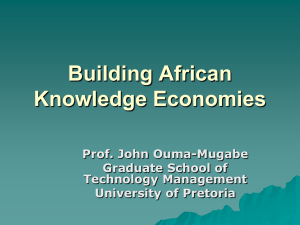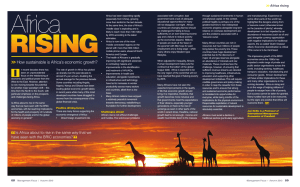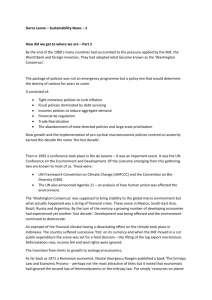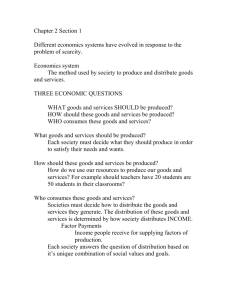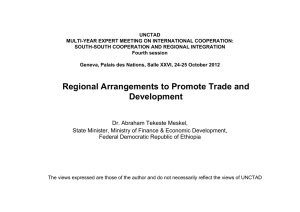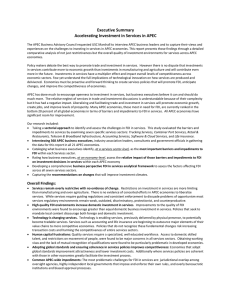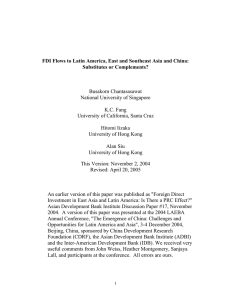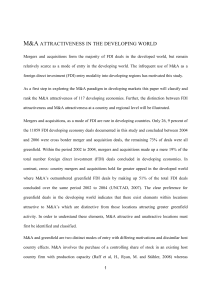Sustaining African Growth in a Global Financial Crisis
advertisement
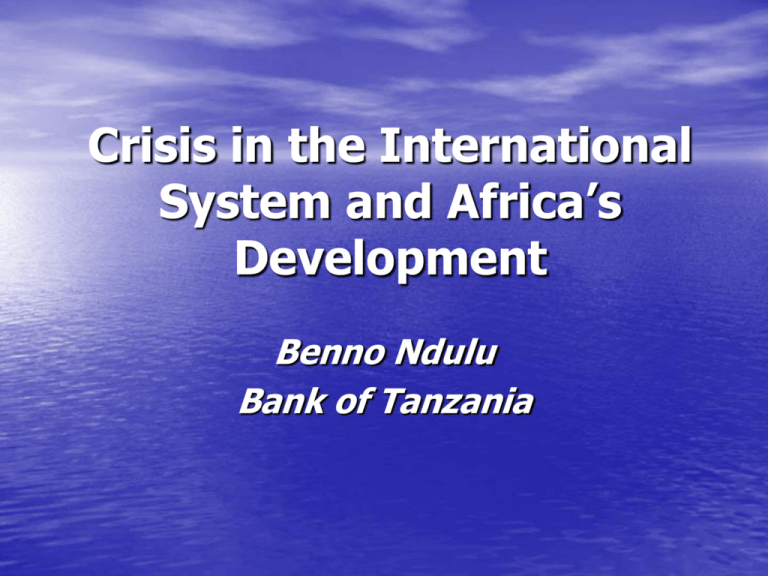
Crisis in the International System and Africa’s Development Benno Ndulu Bank of Tanzania Global Development Paradigms and Changing African Development Strategies Changing attitudes towards roles of • Market, State, and Private sector, and Institutions – 1960s -70s –predominant concern with market and coordination failure - state to proactively mitigatie them - Dirigisme – 1980s –mid1990s – dominant concern with government failure – liberalization and minimalist state role – 1990- onset of crisis - state support functioning of markets esp. in emerging economies • Cross border flow s of goods, services and capital – 1960s-1970s - inward looking – import substitution strategies – 1980s-onset of crisis – Globalization of production , trade and capital - openness and outward oriented straregies Greater Global Interdependence – Influential for Design of Development Strategies • Economies have become much more interdependent – Production in a giant globalized factory – Trade grown faster than production – International fin. flows dwarfed national savings & fin intermediation • Economic and fin. Actors unconstrained by borders significantly weakening role of nation states – Multinational have economically dwarfed host states – Home states often powerless to control actions of multinationals abroad • Contagion has become a powerful tool for propagating booms and crises across borders – Systemically important economies are most influential – African countries largely victims of crises starting from these A Decade of Sustained Growth • 15 countries grew at more than 5.3 percent over the last decade • 21 countries grew at over 5 percent in the last 5 years • Recent pressures aside, 2007 inflation in single digits in 2/3 of SSA countries (spirals of 1973 and 1979 so far avoided) • Significant build up of international reserves from the boom in exports African Vulnerabilities to Global Enterdependence Enhanced by • The extent of exposure of domestic production to external demand in turn dependence on primary commodities and natural resources • The degree of dependence on foreign savings for financing investment (FDI and ODA) • The extent of dependence on imports for domestic production – primary and manufactured products • Weaknesses from acting individually as small countries and markets, when the rest of the world is forming defensive blocs through integration. There is an Upside from the Globalization • Countries in Asia exploited interdependence to record unprecedented growth and Poverty Reduction • African Economies have also benefited greatly – 15 countries grew at more than 5.3 percent over the last – – – – – – decade 21 countries grew at over 5 percent in the last 5 years Recent pressures aside, 2007 inflation in single digits in 2/3 of SSA countries (spirals of 1973 and 1979 avoided) and Avoided A Spiral in 2008 Significant build up of international reserves from the boom in exports More than 2/3 of SSA countries have investment rates exceeding 20% of GDP FDI rose from $11b in 2000 to $53b in 2007 Revenue to GDP ratio increased But the Propagation of the Crisis Threatens the Gains Made • Weakening demand for commodities with global • • recession - vulnerabilities Slowdown in capital flows (FDI) and ODA widen the financing gap Reduced access to credit – sovereign issuance – Credibility of rating agencies • Inflation threatening Growth • High cost of finance with intensified financial risks • Foreign reserves outflow from LICs Main Concerns From the Crisis • Fall out from the Crisis will setback the steady progress made in the last decade – Endanger sustainability of growth (repeat of 1980s and 1990s – post Second oil shock and world recession ) – Undermine macro stability achieved last decade with emergence of resource gap pressures – Erosion of progress in social well being - education, health as countries face large fiscal gaps – Deterioration in the stock of infrastructure • Push achievement of MDGs further away • A threat to social and political stability if safety nets against vulnerabilities - jobs and food – not provided Major Challenges In the Short run Short term – Weathering the Storm • Protecting jobs mainly in the exporting sectors • • • • and those linked to them Ensuring availability of food at affordable prices – food security Protecting Life- saving programs that have shown results – e.g. HIV/AIDS, malaria , tuberculosis Sustaining macro stability - balance of payments support and managing resource gap pressures Protecting the banking system from client distress Global Responses Important • Aware that the recovery of systemically important economies is crucial for revamping demand and prices as well as FDI • Bail out schemes underway will be helpful for recovery of the global economy and to unlock the financial disintermediation • But these should avoid protectionism which will hurt trade • Preemptive measures should focus on correcting regulatory failures - effective surveillance ; strengthening of global regulatory institutions to oversee systemically important countries and players (incl hedge funds &r ating agencies Global Responses cont’d---• Commit to an early conclusion of an ambitious and • • development oriented Doha Round. Shareholders need to agree to increase financing capacity of the BWIs and regional development banks to provide trade finance facilities. Development Partners encouraged to provide technical, financial and political support to the Aid for Trade Initiative. Is De- Globalization an option for Africa ? The Answer is NO • Very strong statistical relationship between African and Trading partners’ growth • Africa’s strong natural Resource base makes it world market dependent • But we can change the terms of engagement over time But African Countries must Build Further Resilience To Shocks • Diversification of our economies and reduced • • • • reliance on primary commodities Better integration of our production and consumption processes – including adding value Reduction in aid dependence and domestic savings mobilization Diversifying our sources of foreign savings building on our recently achieved creditworthiness More effective regional integration to enhance the connectedness of our economies and enhance our global influence as a bloc.
